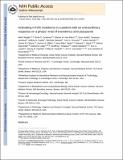| dc.contributor.author | Wagle, N. | |
| dc.contributor.author | Grabiner, Brian C. | |
| dc.contributor.author | Van Allen, E. M. | |
| dc.contributor.author | Hodis, Eran | |
| dc.contributor.author | Jacobus, S. | |
| dc.contributor.author | Supko, J. G. | |
| dc.contributor.author | Stewart, M. | |
| dc.contributor.author | Choueiri, T. K. | |
| dc.contributor.author | Gandhi, L. | |
| dc.contributor.author | Cleary, J. M. | |
| dc.contributor.author | Elfiky, A. A. | |
| dc.contributor.author | Taplin, M. E. | |
| dc.contributor.author | Stack, E. C. | |
| dc.contributor.author | Signoretti, S. | |
| dc.contributor.author | Loda, Massimo | |
| dc.contributor.author | Shapiro, G. I. | |
| dc.contributor.author | Gabriel, Stacey B. | |
| dc.contributor.author | Kantoff, Philip W. | |
| dc.contributor.author | Garraway, Levi A. | |
| dc.contributor.author | Rosenberg, J. E. | |
| dc.contributor.author | Sabatini, David | |
| dc.contributor.author | Lander, Eric Steven | |
| dc.date.accessioned | 2015-04-17T17:39:44Z | |
| dc.date.available | 2015-04-17T17:39:44Z | |
| dc.date.issued | 2014-03 | |
| dc.date.submitted | 2013-12 | |
| dc.identifier.issn | 2159-8274 | |
| dc.identifier.issn | 2159-8290 | |
| dc.identifier.uri | http://hdl.handle.net/1721.1/96675 | |
| dc.description.abstract | Understanding the genetic mechanisms of sensitivity to targeted anticancer therapies may improve patient selection, response to therapy, and rational treatment designs. One approach to increase this understanding involves detailed studies of exceptional responders: rare patients with unexpected exquisite sensitivity or durable responses to therapy. We identified an exceptional responder in a phase I study of pazopanib and everolimus in advanced solid tumors. Whole-exome sequencing of a patient with a 14-month complete response on this trial revealed two concurrent mutations in mTOR, the target of everolimus. In vitro experiments demonstrate that both mutations are activating, suggesting a biologic mechanism for exquisite sensitivity to everolimus in this patient. The use of precision (or “personalized”) medicine approaches to screen patients with cancer for alterations in the mTOR pathway may help to identify subsets of patients who may benefit from targeted therapies directed against mTOR. | en_US |
| dc.description.sponsorship | National Human Genome Research Institute (U.S.) (5U54HG003067-11) | en_US |
| dc.language.iso | en_US | |
| dc.publisher | American Association for Cancer Research | en_US |
| dc.relation.isversionof | http://dx.doi.org/10.1158/2159-8290.cd-13-0353 | en_US |
| dc.rights | Creative Commons Attribution-Noncommercial-Share Alike | en_US |
| dc.rights.uri | http://creativecommons.org/licenses/by-nc-sa/4.0/ | en_US |
| dc.source | PMC | en_US |
| dc.title | Activating mTOR Mutations in a Patient with an Extraordinary Response on a Phase I Trial of Everolimus and Pazopanib | en_US |
| dc.type | Article | en_US |
| dc.identifier.citation | Wagle, N., B. C. Grabiner, E. M. Van Allen, E. Hodis, S. Jacobus, J. G. Supko, M. Stewart, et al. “Activating mTOR Mutations in a Patient with an Extraordinary Response on a Phase I Trial of Everolimus and Pazopanib.” Cancer Discovery 4, no. 5 (March 13, 2014): 546–553. | en_US |
| dc.contributor.department | Massachusetts Institute of Technology. Department of Biology | en_US |
| dc.contributor.department | Whitehead Institute for Biomedical Research | en_US |
| dc.contributor.mitauthor | Sabatini, David M. | en_US |
| dc.contributor.mitauthor | Lander, Eric S. | en_US |
| dc.relation.journal | Cancer Discovery | en_US |
| dc.eprint.version | Author's final manuscript | en_US |
| dc.type.uri | http://purl.org/eprint/type/JournalArticle | en_US |
| eprint.status | http://purl.org/eprint/status/PeerReviewed | en_US |
| dspace.orderedauthors | Wagle, N.; Grabiner, B. C.; Van Allen, E. M.; Hodis, E.; Jacobus, S.; Supko, J. G.; Stewart, M.; Choueiri, T. K.; Gandhi, L.; Cleary, J. M.; Elfiky, A. A.; Taplin, M. E.; Stack, E. C.; Signoretti, S.; Loda, M.; Shapiro, G. I.; Sabatini, D. M.; Lander, E. S.; Gabriel, S. B.; Kantoff, P. W.; Garraway, L. A.; Rosenberg, J. E. | en_US |
| dc.identifier.orcid | https://orcid.org/0000-0002-1446-7256 | |
| mit.license | OPEN_ACCESS_POLICY | en_US |
| mit.metadata.status | Complete | |
